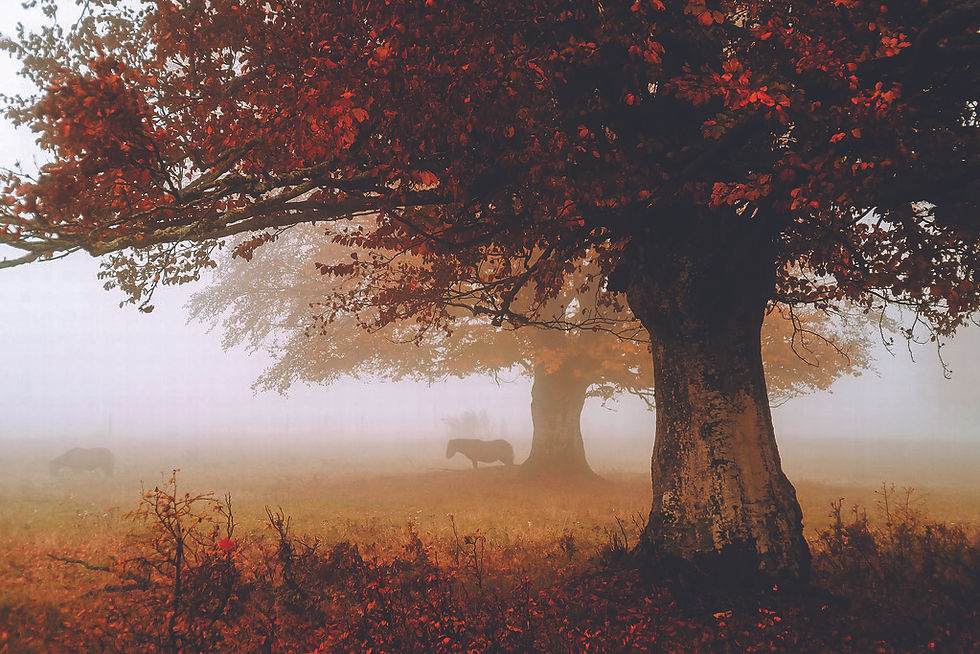Fragments of disapperance / Fragmenti nestajanja
- Анђела Петровски
- Nov 24, 2021
- 4 min read
This photo story was created as a part of many visits I made to Rozanstvo, yet another of many villages in the Balkans. The village is situated in the mountain region of Zlatibor and is under the governance of the municipality of Cajetina, Western Serbia. According to a legend, the name of the village comes from the old Slavic word for birth – рождество, a term also designating Christmas. The dual meaning of this term is not coincidental, as Christmas is celebrated to commemorate the birth of Jesus Christ.
Yet it does sound like a paradox, that the name of a disappearing village would come from the word birth.
Every trip I made to Rozanstvo has slowly invited me to a whole new reality, one that could not be discerned right away from the ever-optimistic faces of village folk. Hidden by the cloud of their optimism, an inevitable historical process was taking place – the village was once again becoming one with Nature.
The extent of this process can easily be recognized by the grass covering the roads to former households which now lay barren.
Surrounded by something we tend to call junk, these houses safeguard the remnants of customs, crafts and beliefs of a once live and vibrant community. It is in them and in this junk that I found the inspiration to start such a story. The story of something happening right in front of our eyes – the usual process of migration which was boosted by industrialization and technical progress of the past decades. Except for the holidays, when the village seemed lively, the migration and population decline have shaped the picture of the village as we see it today.
Realizing this, I started taking photos of “junk” – those artifacts of old, hidden in the abandoned rooms or the rooms still waiting to be abandoned. Some of them were once tools, festive clothes, amulets… And they all served a purpose, they were a part of the villagers’ everyday lives and they all had their own stories. Alas, as people leave this world, so does the meaning of their personal belongings. These things slowly lose their value until they become things only in the philosophical sense. In a house without tenants, a horseshoe on the door has no one to bring good luck to. Similarly, the abandoned photographs without an audience have lost their meaning and there
is no meaningful difference between the photo of a horseshoe and of a bat.
The aim of this work is not to merely to contribute to the photography of disappearing villages, but to put an emphasis on how soon no one will be left to inherit the customs and the oral traditions.
Maybe this is the reason why I’ve chosen to name every photograph according to the
full name of the person whose artifacts are in the photo.
My focus has so far been on dynamic photography, which in this case I had to let go of. The subject required a different approach and thus I decided to use a more static form, which in this case even has some ethnographic elements to it.
Photo & Text by Jelena Zigic
Ova foto priča nastala je tokom mojih mnogobrojnih poseta Rožanstvu, jednom od mnogih sela na Balkanu. Nalazi se na visoravni Zlatibora i pripada opštini Čajetina. Po jednoj od legendi smatra se da naziv sela Rožanstvo vodi poreklo od reči рождествo (rus.rođenje) – Božić. Roždenije se nužno ne odnosi na Božić, već označava rođenje, ali se u ovom kontekstu zaista misli na Božić pošto sam pojam ima starosrpske odnosno ruske korene.
U tom slučaju roždenije postaje rođenje Hristovo tj. Božić. Paradoksalna je činjenica da selo koje svoje ime duguje rođenju , polako odumire.
Svaka nova poseta me je uvodila u jednu novu realnost, koja se na licima preostalih meštana nije isprva mogla prepoznati. Zamagljenja njihovim optimizmom ova realnost je skrivala jedan neumitni istorijski proces vraćanja prirodi. O dometu ovog procesa svedoči trava koja je dovoljno obrasla puteve do domaćinstava u kojima više niko ne živi.
Okružene onim što bismo najčešće nazvali starudijom, ove kuće u sebi čuvaju tragove običaja, zanata i verovanja jedne žive seoske zajednice. Upravo u njima i njihovoj starudiji pronašla sam inspiraciju da započnem pricu o onome što se već dugo odvijalo pred mojim očima. Bio je to uobičajeni proces migracije koji je dobio svoj zamah još tokom industrijalizacije i tehnološkog napretka u proteklim decenijama. Osim tokom praznika, kada je selo delovalo živo, migracije i negativni prirodni priraštaj načinili su od sela ono što možemo videti danas.
Shvativši to počela sam da fotografišem stvari. Predmete u napuštenim prostorijama u kojima više Niko ne obitava, kao i u prostorijama koje će uskoro biti napuštene. Pronašla sam stvari koje su zapravo bile alatke, nekada odeća, amajlije i služile su nekoj konkretnoj svrsi. Služile su ljdima u svakodnevnom životu i imale su svoju priču. Ali kako ljudi odumiru, tako odumire značenje njihovih stvari, sitnica i okućnice. Ovi predmeti gube svoju upotrebnu vrednost i postaju stvari u filozofskom smislu reči. U domu u kom više Niko ne živi, potkovica na vratima koja donosi sreću domaćinu više nema nikakvu vrednost. Napuštene fotografije bez publike isto tako gube značaj i nema razlike u značenju između fotografije potkovice i slepog miša. Ovim radom nisam želela da dam bilo kakav doprinos fotografija sela koje nestaje, već sam želela da skrenem pažnju na to kako običaji i usmena predanja uskoro neće imati kome da se prenesu.
Možda je to razlog što sam svaku fotografiju nazvala po imenu i prezimenu osobe kojoj je pripadao artefakt na fotografiji.
Moj fokus je uglavnom bio na dinamičnim fotografijama, od čega sam u ovom slučaju morala da odstupim. Tematika ove vrste zahtevala je od mene da se opredelim za statičnu formu koja bi se u ovom slučaju mogla nazvati i etnografskom.
Fotografije & Tekst – Jelena Žigić



















Comments